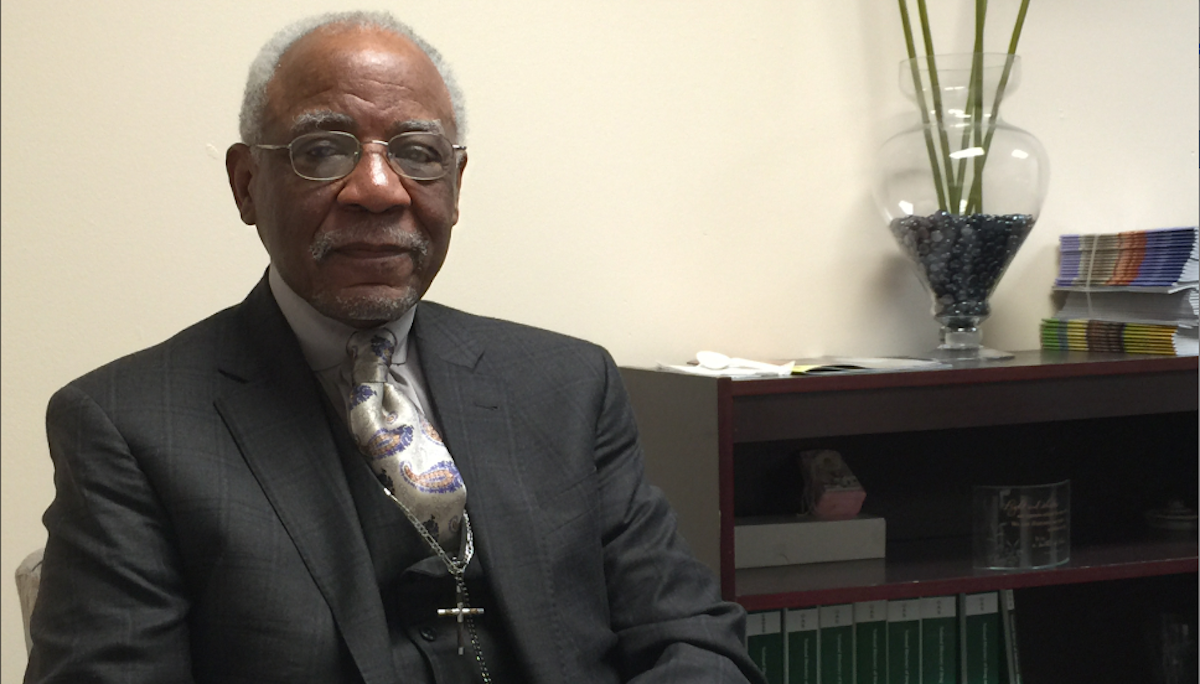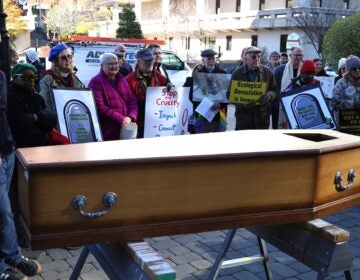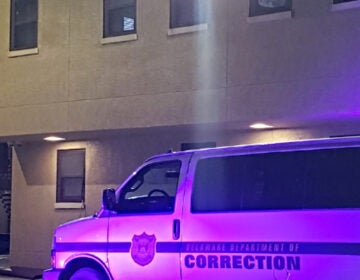Been There, Do This: Mayor Wilson Goode Sr. talks leadership and vision for the city’s future
Listen
Philadelphia City Council has approved renaming a section of 59th Street for former Mayor W. Wilson Goode Sr. who led the city from 1984 to 1992. (WHYY file photo)
As part of our 2015 Philadelphia mayoral-primary coverage, NinetyNine will speak with City Hall’s former second-floor denizens about leadership, challenges facing the city and, among other topics, how best to move Philly into the future.
The first stop on our former-mayoral tour was a small fourth-floor office on Arch Street where W. Wilson Goode Sr. helms Self Inc., a organization which aims to provide people with “self-sufficiency in life management by developing strength of character and economic independence.”
Over the course of an hour-plus interview with WHYY’s Brian Hickey and Katie Colaneri, the city’s first African American mayor touched on an array of topics, not the least of which was the fact that most of the current candidates have already reached out to talk about the race with him.
Excerpts of NinetyNine’s discussion with Goode will air on Wednesday’s NewsWorks Tonight and Thursday’s Morning Edition.
What follows are 20 quotes from the interview:
1. “When I walked in and sat at my desk for the first day [as mayor], I thought ‘This is really tougher than I really thought it was.’ It made me feel fortunate that here I was, in this position, and I had a chance to really solve some longstanding problems facing the city. In a word, I felt inspired by the opportunity that was presented to me.”
2. “People ask me what I liked most about being mayor. It was solving problems for people who felt powerless, especially in neighborhoods that felt as if they’d been left out for a very long time, for things like potholes and abandoned houses and dirty streets, those kinds of things. It was wonderful to be in that position. I enjoyed every day I was in office.”
3. “What you’ve done in the past is pretty much what you’ll do in the future. Look at the kinds of things that people have involved themselves with in the past, and you will see the kinds of things they will involve themselves with now and in the future. People don’t suddenly change because they become mayor. They are who they are.”
4. “I have a sense of my legacy, yes. But what I [also] have a sense of is that there are people today who are living better lives because of my passion for those who were the least among us, a sense that I fulfilled my purpose for being in that office when I look at the fact that there are African Americans and women in the government today who started out under my administration and became commissioners and heads of departments and units in government.”
5. “What the city needs most, I believe, is somebody who has passion, and an understanding of all the problems facing the city — from homelessness to business, from children to the aged, a clear understanding of what the issues are facing the city in all of those areas.
“We need someone with integrity — intellectual integrity — and someone with the ability to solve problems. We need someone who is political enough to get people to work with them, but not too political that they will sell the city in order to get something done. We need someone with the intellectual toughness to get the job done and that is to understand that, at times, you need to be intellectual but at times you need to be practical.
“I started with passion, but I will end with love. You have to love this city and want to see it improve.”
6. “All of the announced candidates have come to see me, and some who have not announced have come to see me.
“The first question I ask is, ‘Do you want to be mayor? I know you want to run for mayor, but do you want to be mayor.’ The second part of that is ‘Do you want to do what a mayor needs to do in order to be successful in the job that you said you want to run for?’
“Then, I ask ‘What is your plan for winning? What formula do you come forth with that says ‘because I am who I am, these are the people who will vote for me.’
“Naturally, many people have never thought of those things and therefore they’re starting out needing to think through ‘Do I really want to do this?’
“Many people see the job as standing in front of a camera and speaking to the public, talking into a microphone on the radio and speaking to the public that way, going to public events. They don’t see the bare-knuckle things we need to do in order to get a budget passed, establish priorities and fight for what you believe in and make sure you go out there and try to get those things done.
“The public piece is the easy piece. The tough piece is understanding that you are responsible, as mayor, for governing the entire city. You’re responsible for every police officer, every firefighter, Department of Human Services, Department of Streets, for all the things that happen. So, how are you going to manage all those things, and govern, and lead, and have people who work for you be inspired to do that?
“It’s important that people who seek the job realize it takes real leadership in order to do that. It takes more than an announcement, and raising some money, and going out and campaigning. It takes some real toughness. Are you prepared to spend 14 or 16 hours every day, doing what a mayor has to do to make it work, and that’s seven days a week? If you can do that, then you can probably be a good mayor. If you’re not prepared to do that, you probably will not only not win, but if you won, you would not be a good mayor.”
7. “Someone said to me, ‘I never thought about that’ [to the ‘do you want to be mayor’ question]. I have to think about that a bit more. Do you really want to be mayor and do what the mayor has to do?’ There was a pause. That was surprising to me. That’s not a good sign at all. You have to think about that. This means that they haven’t thought about what they wanted to do once they became mayor.”
8. “You have to love the city, love the people, let me in that office, let me go in there and do everything I can to make this city better. When you have passion like that, you are inspired to go there and do everything that you can every single day.
“Many people — not necessarily those running for mayor — run for office today not because they have passion for anything other than being in elective office. When you elect someone of that nature, you get someone who is interested in the office, but not what that office can do to make the city better.”
9. “I think we have, in this city, a kind of lack of enthusiasm for elective office on the part of many people. That’s not the way they want to live their lives. I’m 76 years of age. I can say we’re not attracting the most talented people anymore to these top positions in government. We are attracting people who desire to be in elective office, but not necessarily who desire to be passionate about making government work the way it ought to work.
“People who run mostly for the sake of the office, not because they feel they can use the office to get done something very specific that needs to be done in the city. People who like to say ‘that’s something I’d like to do in my life’ rather than ‘if I can get into that office, I will show them what I can do as an elected official. I will show them how I can turn some things around, how I can reform things.'”
10. “People in the 1960s, 70s, most of the 80s, were people who came up with social movements, with a passion to do things for the right reasons. There was a lot of human contact at that time. Some of it is generational. Some of it, today, people under 40 years of age don’t even remember when I was mayor.
“I came into government and politics through service in my neighborhood as a block captain, neighborhood and citywide leader, as part of a civil-rights movement fighting for civil rights and human rights, fighting for the right to vote, to break down the party structure. When I first got involved, there was no African American in the state of Pennsylvania who was elected to office other than by party election, and in 1969, I ran Hardy Williams campaign and he became the first African American elected to office.
“It’s partially our fault, mine and others who did that, by not remaining vigilant to make sure the message kept coming that you have to keep fighting. In the late 1980s, and through the 1990s, people running for office started to emerge as people who just wanted to be in office.
“People who run for office today run because they’ve been staff for someone in office already, through a political system rather than a social and civil-rights system. The lens that people see this through is not through the lens of struggle and overcoming and trying to make things better and trying to improve the lives of people.”
11. “The last 25 years, there has emerged a different group of people out there looking at politics through a different lens than I’ve looked at it which was as a tool to really get things done. They look at it as a tool to elevate themselves to a higher position. I just want to make it clear that there are exceptions to this; there are some people there because they feel a deep passion for what’s going on.”
12. “What is happening now [with the protest movement] is very promising. More and more people are going to be held accountable. I [recently] spoke to one of the people part of this protest movement, and I said to them, ‘Why don’t you talk to the elected officials?’ And they said, ‘We are going to replace the elected officials.’ So that is promising. If not this time, next time around, if they keep it up. The thing about movements is you have to keep it up, and if they keep their eyes on the ball, focused on what they want to do and how change can really come about, they can, from my point of view, be really successful and can reintroduce the kind of movement that brought me and others like me into office with the same passion we had.”
13. “The office of mayor is a tool. You have extraordinary power to do good and make things better. If you see it as something to make you a celebrity, you’re going to end up not being successful.”
14. “If I was running today, I would run to fix the school system. The No. 1 problem facing the city is [the need for an educational system that educates children and meets them where they are and helps them to become what they should be in life. Some children come to school not having had kindergarten, any type of teaching beforehand. They come straight from home with nothing in terms of educational development. We can’t assume that every child who comes to school is where they ought to be.
“Every child should have the opportunity to achieve. We need a system that will say we know that you did not go to nursery school, preschool, kindergarten, and we believe there is a special course over here, remediation, where we can begin to work with you. Education is where I would start.
“The second is related to education. People need jobs. People need work. We have to do something about the high poverty rate in the city, and it’s all related. Something about crime. Something about dealing with people capable of filling jobs. All these things are related.
“I still believe what I’ve believed all along: It all starts with education, a basic school system that can educate every child where they are, and bring them to where they need to be, so that the workforce in the city and region can have the kind of educated public that it needs to fill those jobs.”
15. “It’s a business. We invest in government and we expect government to give us a return on our investment, and that return is something we call service. It’s about taking the taxpayers’ dollars and then providing service and making sure that we’re getting the most bang for the buck so we can say to the citizens when we meet them, ‘I am a great steward of your dollars. I’m doing everything I can to spend every dollar I spend as efficiently and effectively as I can spend it.’ People don’t think about that. Most elected officials don’t think about that. But I do.”
16. “The mayor may not be able to remedy [the city’s public-school issues] in eight years, but that does not stop the mayor from leveraging and using the bully pulpit to speak and speak and speak on the problem.
“[Mayors Street and Nutter] felt, as I felt when I was mayor, that not being in full control of the school system is a real problem. That should be fixed. The mayor should be able to appoint the school board, should be held accountable for educating the children in the school system, should be able go to Council and fight with the state and the feds for money. It has to be the responsibity of the mayor to lead in education. It can’t be like that when you have a lot of other people with their fingers in the pot and no one is taking full responsibility. The mayor has to be the one who is responsible.
“If I was running, I would talk about that, and talk about its relatedness to all these other things we feel in the city. To poverty. To crime. To the growth of the correctional system. To all the other social facing the city. I would link it to all those things and say, ‘If you want to solve this problem, you can solve it by fixing the educational system in the city.”
17. “I’ve not talked with any of [the candidates] about that at this point. What I will do is when there’s a real beauty contest between two people, I will have that conversation. At this point, they have to decide how they want to lead and govern, what their priorities are. … I’m simply telling them they have to have a passion for the city.”
18. “I’m satisfied that there are people in this field who could potentially be great mayors. I don’t think they’ve exhibited that yet in terms of what they’re talking about because they’re not talking about anything at this point. But there are people out there that come from a pedigree that would lead me to believe that, if given the opportunity, they’d make great mayors.”
19. “I came into office in 1980, under [Mayor] Bill Green, and have seen tremendous change in this city, tremendous improvement in this city, and I am very hopeful for the future. Very hopeful despite the poverty rate, despite the failing school system. I am hopeful because there is great leadership here in the corporate and civic communities, and I think great leaders will emerge in the civic community. That’s why I’m very hopeful. I did not think in 1980 that we would be where we are today.”
20. “My advice [to the candidates] is if you really don’t love this city, have passion for this city, and want to bring about fundamental change in education and poverty rate and the overall structure of the city, then don’t run for office, because we need a leader that’s going to do that.”
WHYY is your source for fact-based, in-depth journalism and information. As a nonprofit organization, we rely on financial support from readers like you. Please give today.




